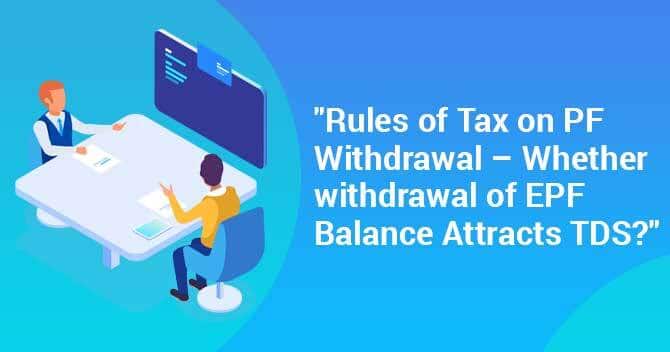As per the provisions of the Income-Tax (I-T) Act, 1961, the accumulated balance in EPF that is payable to an employee is excluded from the computation of the total income, in case certain conditions are met.
The Employee Provident Fund is a retirement benefits scheme offered by the EPFO in which both the employee and the employer contribute 12 percent of the salary (10 percent for non-government organizations) towards EPF. The current interest rate for EPF deposits is 8.10 percent per annum. As per the provisions of the Income-Tax (I-T) Act, 1961, the accumulated balance in EPF that is payable to an employee is excluded from the computation of the total income, in case certain conditions are met. This means the withdrawal is exempt from tax and the individual need not show the same in the return as income. However, it’s taxable under certain conditions.
Withdrawal of EPF is taxable when:
- EPF is withdrawn before five years of continuous service: If an employee withdraws from EPF before completing five years of continuous service, then TDS (tax deducted at source) is deducted. If the amount is less than Rs 50,000, no TDS is deducted, however, if the individual falls under the tax bracket, he or she has to offer such EPF withdrawal in his return of income. If the amount is more than Rs 50,000, then 30 percent TDS is deducted if PAN is not furnished. No TDS is deducted if forms 15H and 15G are furnished and the same rules of offering the amount in the income tax returns are applicable.
- When EPF is unrecognised: An EPF which is not approved by the Commissioner of Income Tax is considered an unrecognized provident fund. If your EPF is recognized by any authority other than the Commissioner of Income Tax, like if you are a member of URPF, your withdrawals are taxed, even after completing five years of continuous service.
Withdrawal of EPF is not taxable when:
- On Completion of 5 years of continuous service: For EPF recognized by the Commissioner of Income Tax, EPF withdrawals are exempt from TDS if the individual has completed 5 years of continuous service. In the calculation of 5 years, the tenure with the previous employer is also included, in case your EPF balance from the old employer is transferred to the new employer. Further, such withdrawals will be excluded from the computation of the total income, thus exempt from income tax.
- On termination beyond the control of the employee: If the service of an individual is terminated due to the employee’s ill-health, or by contraction or discontinuance of the employer’s business or any other cause beyond the control of the employee, then EPF withdrawals are exempt from TDS and excluded from total income.
- On transfer of PF: If the funds accumulated in PF are transferred from one account to another recognized provident fund upon a change of job then such transfer is exempt from TDS and not included in the computation of total income.
- Upon transfer to NPS: In case the entire balance in EPF of the employee is transferred to his/her NPS account, then such transfer is exempt from TDS and will be excluded from the computation of total income.


